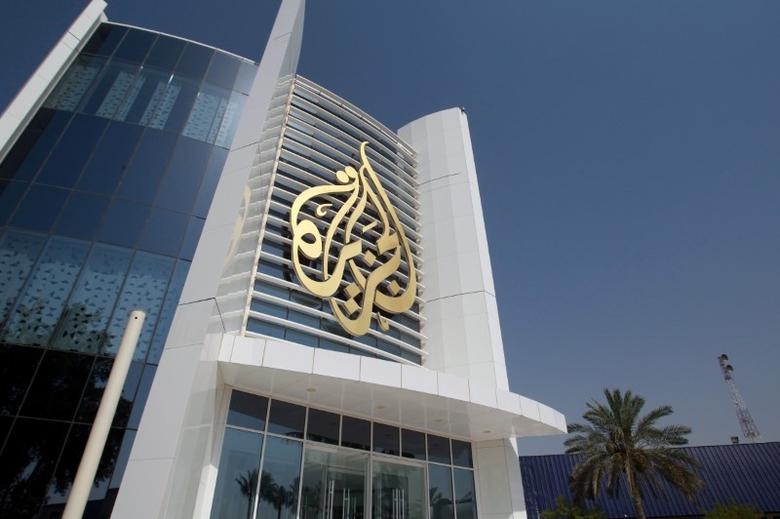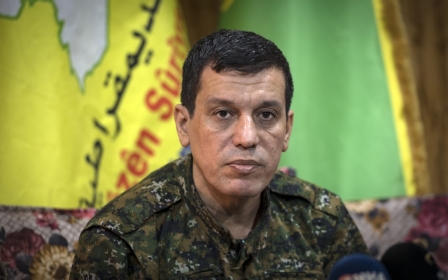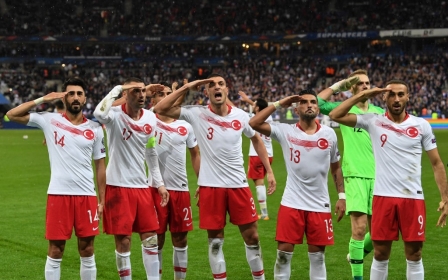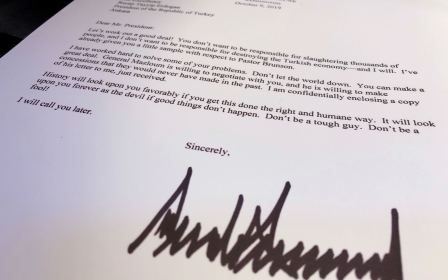For Turkey, Al Jazeera English has become an irritant to its Qatar partnership

For years Turkish officials have lamented Al Jazeera English's Turkey coverage, saying the Qatar-funded TV channel focused too much on alleged human rights abuses in the country.
Turkey and Qatar are close allies, a relationship forged over the years through joint military operations in Somalia and Libya, and a united front against Doha's Gulf neighbours in the region. Ankara has a major military base in the emirate.
In government circles, articles and TV segments critical of Turkey would be circulated with a feeling of anger, and at times phone calls would be placed to Doha in an attempt to tone down the negative coverage.
Largely, those long simmering tensions between the countries over the Arab media giant were kept under wraps, but in recent days they have devolved into all-out hostility.
Last week, Turkish public news broadcaster TRT and its sister English channel TRT World simultaneously begin to criticise Al Jazeera for its editorial stance on the ongoing Turkish offensive in northeastern Syria.
TRT accused Al Jazeera of providing a large platform for analyses it said were anti-Turkey, and railed against its quoting of Mazloum Abdi, commander of the Kurdish-led SDF militia Ankara is fighting against in an assault dubbed "Operation Peace Spring".
The SDF is dominated by the YPG militia that Turkey considers an offshoot of the outlawed PKK militant group.
“Al Jazeera frequently cited the statements by Ferhad Abdi Sahin [Mazloum Abdi], one of the ringleaders of the terror organisation,” a piece in TRT said.
“The reports that described PKK/YPG terrorists as simply Kurdish fighters have caused some eyebrows to raise.”
TRT World, on the other hand, has drawn similarities between the Syria coverage on Al Jazeera and its Saudi-owned rival Al Arabiya, underlining the fact that both produced reports simply naming YPG as Kurds and ignoring its connections with the PKK, which Turkey and many other countries view as a terror group.
'The reports that described PKK/YPG terrorists as simply Kurdish fighters have caused some eyebrows to raise'
- TRT
The channel subsequently featured a Human Rights Watch report that urged the Qatari government to investigate migrant workers’ deaths in the country.
More recently, on Monday, Daily Sabah, an English language Turkish newspaper that is closely affiliated with Turkish government, published a scathing editorial blaming Al Jazeera for spreading “anti-Turkey propaganda under the pretext of independent and objective journalism”.
The editorial said the Turkey-Qatar partnership’s future was at stake if Al Jazeera doesn’t “weed out” all individuals who “poison” the alliance, and called on the Turkish government to consider Al Jazeera a hostile outlet.
'Jaw-dropping'
Some journalists, such as the BBC’s former Turkey correspondent Mark Lowen, condemned the editorial for its rhetoric and said that it was in part related to the Turkish government's crackdown against media.
“Jaw dropping. This is in essence an order by Turkey's government mouthpiece to its brother-in-arms in Qatar to follow its policy of clamping down on anyone willing to challenge the propaganda," he said on Twitter.
Media watchdog Reporters Without Borders ranks Turkey 157th out of 180 countries in its 2018 press freedom index. A report last year by the New York-based Committee to Protect Journalists said there were at least 68 journalists "jailed for their work" in Turkey.
Why is Turkey invading northeast Syria?
+ Show - HideWho is fighting who?
Democratic Union Party (PYD)/Peoples Protection Units (YPG)
Founded in 2003, the PYD and its military wing the YPG are the ideological sister group of the Kurdistan Workers Party (PKK), which has fought a decades-long conflict with Turkey.
Following the beginning of the Syrian civil war in 2011, the PYD managed to take control of much of the Syria's north in the security vacuum that followed.
The group claims to espouse an ideology called "democratic confederalism", based on the ideology of PKK founder and leader Abdullah Ocalan, who has been in prison in Turkey since 1999.
Turkey
Turkey has long viewed the growth of the PYD with deep concern, and a peace process between Turkey and the PKK collapsed in 2015 in part over the spread of the Syrian Kurds' influence.
Since then, Erdogan has repeated his determination that he would "never allow the establishment of a Kurdish state in northern Syria".
What does Turkey want in northern Syria?
Turkey fears that a pro-PKK entity on its southern border would inevitably become a launchpad for attacks on Turkey.
In addition, Turkey wants to expell Syrian refugees from Turkey and resettle them in a "safe zone" it plans to create in northern Syria.
Turkey has the largest refugee population in the world, and the presence of Syrians in the country has increasingly led to animosity from Turks who blame them for crime, unemployment and the dilution of Turkish culture.
What does the PYD want in northern Syria?
The PYD's long-stated aim has been the creation of a statelet on the basis of Ocalan's ideology, as well as protecting Kurdish rights.
The area controlled by the PYD, known as Rojava, has established autonomy with networks of local councils and forums that aim to promote decentralised democracy - though the group has been accused of enforcing a one-party rule in the region.
What does the US-led coalition want?
Donald Trump was elected on a platform of isolationism and has touted the defeat of IS as the sole reason for US involvement in Syria - now that has largely taken place, Trump has argued the United States has no need to remain.
The biggest fear for the US and its allies is that Turkey's takeover of PYD-controlled areas could see the release of some of the 15,000 IS fighters previously captured by the Kurds and their allies.
What does the Syrian government (and its allies) want?
The Syrian government, as well as its close allies Iran and Russia, are happy about the US' decision to withdraw from the north, but have expressed concern about the violation of Syria's sovereignty by Turkey.
Syrian President Bashar al-Assad hopes that, when faced with the threat from Turkey, the PYD will throw their lot in with him in order to avoid total defeat.
Assad has repeatedly said he aims to regain control of all of Syria, and if the PYD was to ally with him formally, it would bring the largest area hitherto out of his control back under Damascus' influence.
One well-placed Turkish source, who is familiar with the Turkish government’s thinking, told Middle East Eye that Foreign Minister Mevlut Cavusoglu transmitted Ankara’s disappointment over Al Jazeera during his visit to Qatar over the weekend. However, the response wasn’t satisfactory.
“When it comes to Qatari interests, Al Jazeera English doesn’t care about its so-called independent editorial stance. They defend them at all cost. But they treat Turkey differently. They blame Turkey for massacring Kurds. They don’t even acknowledge the ties between the PKK and YPG,” the source said.
'Doesn’t Al Jazeera think good relations with Turkey are in Qatar’s interests? Or is it some people within Al Jazeera’s management doing their own thing?'
- Turkish source
“Doesn’t Al Jazeera think good relations with Turkey are in Qatar’s interests? Or is it some people within Al Jazeera’s management doing their own thing?”
MEE has reached out to Al Jazeera and Qatar embassy in Ankara for a comment, with no response by the time of publication.
Some observers see Turkey’s anger as understandable, even if they believe there is no anti-Turkey policy in Qatar.
“Qatari officials made it clear that they support Operation Peace Spring in Syria, but they have their own limit that should be taken into consideration,” Ali Bakeer, an independent analyst who closely follows Turkish-Qatar relations told MEE.
Bakeer believes the root cause of the problem is the different perceptions each side has on the role of media.
“From a Qatari perspective, Al Jazeera English is totally different than Al Jazeera Arabic. They have different audiences and independent editorial lines,” he said. “I wouldn’t say the same for TRT and TRT World, but I'm sure they will do.”
The Turkish source was grim about the future.
"We might see some Turkish columnists write about all of this tomorrow or this week. There might be public calls to President Recep Tayyip Erdogan to withdraw troops from Qatar," the source said.
This article is available in French on Middle East Eye French edition.
Middle East Eye delivers independent and unrivalled coverage and analysis of the Middle East, North Africa and beyond. To learn more about republishing this content and the associated fees, please fill out this form. More about MEE can be found here.





